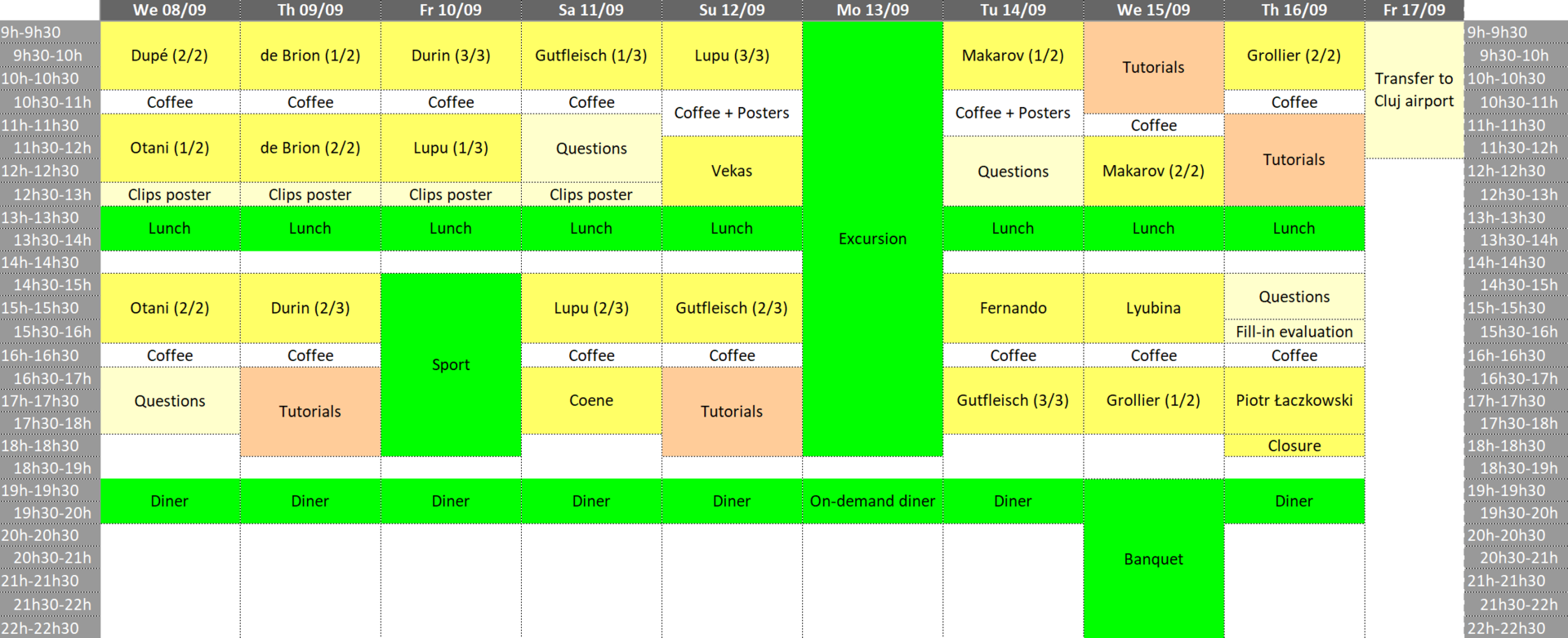Program

List of topics, lecturers and various activities for ESM 2021.
Timetable
The timetable is largely finalized, only minor aspects are liable to adjusted. Attendees are requested to arrive on Monday Sep.6th until evening, and leave on Friday Sep.17th from the morning. Download (png, updated 2021-10-06)
Lectures
Introduction to the School (1h)
- Opening
- Motivation for the School: Daniel Andreica, Cluj-Napoca, Romania.
Fundamental properties (15h)
- Units, fields, moments, forces (90'): Gianfranco Durin, Torino, Italy. [ Slides ]
- Magnetism on the atom (90'): Viorel Pop, Cluj-Napoca, Romania. [ Slides | Recording ]
- Exchange interactions and magnetic structures (180'): Bertrand Dupé, Liège, Belgium. [ Slides | Recording: pt.1 & pt.2 ]
- Crystal electric field and magnetic anisotropy (180'): Sophie de Brion, Grenoble, France. [ Slides ]
- Transport and spintronics (180'): Yoshichika Otani, Tokyo, Japan. [ Slides | Recording: transport and spintronics ]
- Micromagnetism and magnetization processes (180'): Gianfranco Durin, Torino, Italy. [ Slides (pt.1; pt.2) | Recording ]
Magnetic materials (9h)
- Soft magnetic materials (90'): Nicoleta Lupu, Iasi, Romania. [ Slides ]
- Strategic materials in the energy transition (90'): Oliver Gutfleisch, Darmstadt, Germany. [ Slides | Recording ]
- Multifunctional magnetic materials (90'): Denys Makarov, Dresden-Rossendorf, Germany. [ Slides | Recording ]
- Molecular magnetism (90'): Luis Fernando, Zaragoza, Spain. [ Slides | Self-evaluation | Recording ]
- Magnetic Fluids (90'): Ladislau Vekas, Timisoara, Romania. [ Slides | Recording ]
- Magnetic heterostructures and nanoscopic materials (90'): Denys Makarov, Dresden-Rossendorf, Germany. [ Slides | Recording ]
Applications (10.5h)
- Permanent magnets for efficient energy conversion (90'): Oliver Gutfleisch, Darmstadt, Germany. [ Slides | Recording ]
- Magneto (and multi-)caloric materials for efficient refrigeration (90'): Oliver Gutfleisch, Darmstadt, Germany [ Slides | Recording ]
- Computing: memories, artificial intelligence, quantum technologies (180'): Julie Grollier, Paris, France.
- Automation: Sensors and communication (180'): Nicoleta Lupu, Iasi, Romania. [ Slides | Recording ]
- Magnetism for biology and medicine (90'): Annelies Coene, Ghent, Belgium. [ Slides | Recording ]
Career perspectives
Two contributions are scheduled from outside the world of lab research. These are intended to promote thinking about economical, ethical or societal issues, and provide an opportunity to discuss and debate about career opportunities for PhD scientifists beyond their defense.
- Career perspective: Julia Lyubina, Dr., Head of Global New Business Development | Silanes at Evonik.
- Career perspective: From Magnetism to data mining: Piotr Łaczkowski, software engineer at Vestiaire Collective.
Other activities
Tutorials and practical (4-6h)
Tutorials and practical are organized to practice the use of numerical, analytical or experimental techniques, related to topics covered by the lectures. Computers will be provided on-site and readily setup for some of the practicals. Each tutorial/practical is typically 2h. Attendees are asked on-site for their wishes to attend such or such practicals, however it is not possible to attend all of them. On the average, three practicals may be attended by every participant.
Library
A library consisting of a large set of books dedicated to various aspects of Magnetism is on display during the entire School. Its purpose is first to get students aware of the existing books, get acquainted with their use, and also serve as a support for activities during the School. See the list of books on display at ESM2017 or the list of most-commonly used books in the permanent Library of the ESM.
Question-Answer sessions (6h)
The purpose of a research School is to provide young scientists with the basics in a working field. With this respect interactivity between students and lecturers should be promoted. Like in the previous editions, a key aspect of this interactivity is the possibility to raise questions at the end as well as during the course of the lectures. Besides, several sessions of questions take place, during which the lecturers or voluntary students present in more detail issues raised by the students during the lectures or anonymously through a question-box. See the list of questions raised in 2018. Questions are now managed through the private Discord server & chat of ESM, and is not publicly available. Recordings: [ Session 1 | Session 2 | Session 3 | Session 4 ]
Posters
We encourage participants to bring posters to present their work. Students are asked to present their poster in a one-slide-two-minutes presentation as an exercice to summarize their work.









